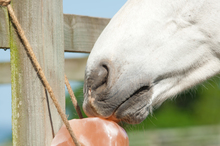Your horse sweats more during the summer, making electrolyte supplementation worth considering. But electrolytes alone will not protect against dehydration.

Horse licking a salt block
Your horse sweats more during the summer, making electrolyte supplementation worth considering. But electrolytes alone will not protect against dehydration.
Your horse needs to have enough sodium (salt). One ounce per day (two tablespoons) is adequate for maintenance during cool months, but hot, humid weather calls for at least two ounces per day, and more if your horse is in work of any kind.
Make salt a higher priority than electrolytes
One way to accomplish this: provide a plain, white salt block, Redmond salt rock, or Himalayan salt rock in close proximity. But make sure your horse licks it; many horses do not, due to tiny scratches that form on the tongue.
Even better is to offer coarsely granulated salt free choice by pouring some in a small bucket. You can also add salt to each meal.
Iodized table salt and Redmond and Himalayan rocks offer a small amount of iodine. Take this into consideration if your horse already receives iodine from another source. Total iodine intake should not exceed 5 mg per day.
Be aware that electrolyte supplements should be given only to a horse that is already in good sodium balance. They are designed to replace what is lost from perspiration and should contain at least 13 grams of chloride, 6 grams of sodium, and 5 grams of potassium per dose.
If your horse works more than two hours at a time, provide a dose of electrolytes after exercise by adding it to a gallon of water, top-dressing a feed, or offered via syringe. And always, be sure to keep fresh, clean water nearby.
About Dr. Getty
Juliet M. Getty, Ph.D. is an independent equine nutritionist with a wide U.S. and international following. Her research-based approach optimizes equine health by aligning physiology and instincts with correct feeding and nutrition practices.
Dr. Gettyâs comprehensive resource book, Feed Your Horse Like a Horse, is available at www.GettyEquineNutrition.com -- buy it there and have it inscribed by the author, or get it at Amazon (www.Amazon.com) or other online retail bookstores. The seven separate volumes in Dr. Gettyâs topic-centered âSpotlight on Equine Nutritionâ series are available with special package pricing at her website, and also at Amazon in print and Kindle versions. Dr. Gettyâs books make ideal gifts for equestrians.
Find a world of useful information for the horseperson at www.GettyEquineNutrition.com: Sign up for Dr. Gettyâs informative, free e-newsletter, Forage for Thought; browse her library of reference articles; search her nutrition forum; and purchase recordings of her educational teleseminars. Reach Dr. Getty directly at gettyequinenutrition@gmail.com. She is available for private consultations and speaking engagements.
By Juliet M. Getty
